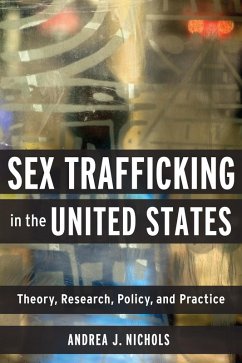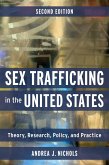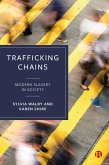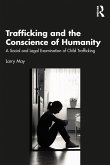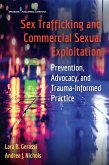Sex Trafficking in the United States is a unique exploration of the underlying dynamics of sex trafficking. This comprehensive volume examines the common risk factors for those who become victims, and the barriers they face when they try to leave. It also looks at how and why sex traffickers enter the industry. A chapter on buyers presents what we know about their motivations, the prevalence of bought sex, and criminal justice policies that target them. Sex Trafficking in the United States describes how the justice system, activists, and individuals can engage in advocating for victims of sex trafficking. It also offers recommendations for practice and policy and suggestions for cultural change.
Andrea J. Nichols approaches sex-trafficking-related theories, research, policies, and practice from neoliberal, abolitionist, feminist, criminological, and sociological perspectives. She confronts competing views of the relationship between pornography, prostitution, and sex trafficking, as well as the contribution of weak social institutions and safety nets to the spread of sex trafficking. She also explores the link between identity-based oppression, societal marginalization, and the risk of victimization. She clearly accounts for the role of race, ethnicity, immigrant status, LGBTQ identities, age, sex, and intellectual disability in heightening the risk of trafficking and how social services and the criminal justice and healthcare systems can best respond. This textbook is essential for understanding the mechanics of a pervasive industry and curbing its spread among at-risk populations.
Please visit our supplemental materials page (https://cup.columbia.edu/extras/supplement/sex-trafficking-united-states) to find teaching aids, including PowerPoints, access to a test bank, and a sample syllabus.
Andrea J. Nichols approaches sex-trafficking-related theories, research, policies, and practice from neoliberal, abolitionist, feminist, criminological, and sociological perspectives. She confronts competing views of the relationship between pornography, prostitution, and sex trafficking, as well as the contribution of weak social institutions and safety nets to the spread of sex trafficking. She also explores the link between identity-based oppression, societal marginalization, and the risk of victimization. She clearly accounts for the role of race, ethnicity, immigrant status, LGBTQ identities, age, sex, and intellectual disability in heightening the risk of trafficking and how social services and the criminal justice and healthcare systems can best respond. This textbook is essential for understanding the mechanics of a pervasive industry and curbing its spread among at-risk populations.
Please visit our supplemental materials page (https://cup.columbia.edu/extras/supplement/sex-trafficking-united-states) to find teaching aids, including PowerPoints, access to a test bank, and a sample syllabus.
Dieser Download kann aus rechtlichen Gründen nur mit Rechnungsadresse in A, D ausgeliefert werden.

